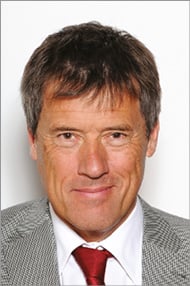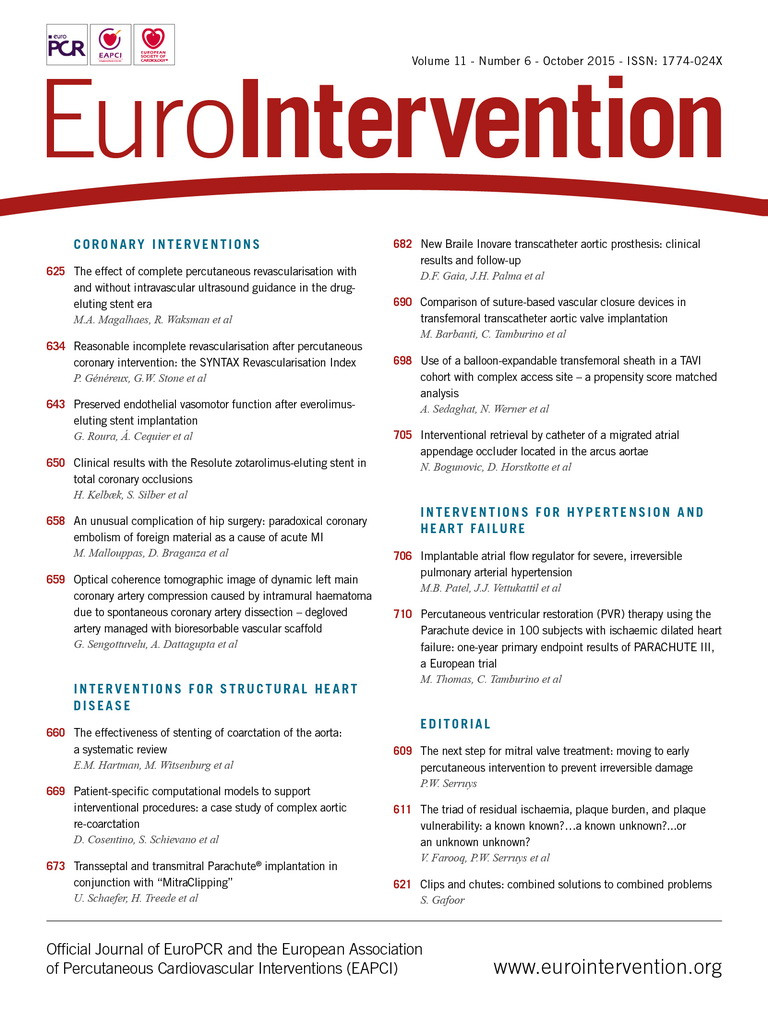NEWS
■ The ESC is proud to announce the launch of a Grant Programme for Medical Research Innovation, supported by an independent grant from Boehringer Ingelheim.
■ Four grants of up to €400 000 each will be awarded. Application deadline is 1 November 2015. http://www.escardio.org/Guidelines-&-Education/Career-development/Grants-and-fellowships/ESC-Grants/esc-grants-for-medical-research
■ Interventionalist under 36? Apply to the EAPCI Training and Research Grants programme 2016 before 15 January 2016.
■ EAPCI Interventional Fellows Course: don’t miss the Krakow course from 25-28 November in Krakow, Poland.
■ Visit CathGo at the new EAPCI website: an online database of centres offering interventional and research opportunities, visit today this EAPCI initiative to boost the mobility of Fellows and training across Europe!
Franz Weidinger, Chairman

Franz Weidinger
This EAPCI committee was initiated in 2006 at the creation of the Association under the EAPCI presidency of William Wijns. The aims of the committee are the development and organisation of, and participation in European registries, and ultimately to provide a multinational database within the framework of the ESC. Similar to previous collaborations with the Euro Heart Survey (2004-2009), EAPCI has decided to collaborate with the EURObservational Research Programme (EORP) of the ESC.
The main activity in which this committee is involved is the STEMI registry, launched in January 2015 together with EORP. This registry will capture the current state of primary PCI as the preferred reperfusion modality in STEMI, but it is also planned to include thrombolytic therapy and non-reperfused patients. In addition, the efficacy and safety of adjunctive therapy of primary PCI will be investigated. The protocol and CRF of this registry were jointly developed by the Acute Cardiac Care Association (ACCA) and EAPCI. The design of the registry stipulates a recruitment of patients for a limited period of time (“snapshot survey”) in order to limit the burden of data collection and potential double data entry due to existing national registries running in parallel. Recently, it has been decided to broaden the participation from 12 countries initially to all ESC member countries willing to join this registry. At the time of the ESC congress in London, 745 patients with STEMI and onset of symptoms <24 hours had been consecutively enrolled in 41 centres in nine countries. The expectations of participating countries from this registry, having been explored in a questionnaire, are to obtain scientific “real-world” data on PPCI as well as a quality assessment tool, e.g., to show the adherence to guidelines. Some also expect epidemiologic information or validation of indications for PPCI. Thus, this registry may be of benefit to participating centres and countries for a variety of reasons, including benchmark reports to measure the local performance of PPCI.
The other project that the committee is involved in is the Transcatheter Valve Therapy registry, currently chaired by Martine Gilard. Also, a survey is underway to gather information on the needs of countries to establish TAVI programmes as well as to increase the rate of TAVIs performed.
The hope of the D&R Committee, currently under the co-chairmanship of Sonia Petronio and Franz Weidinger, is that a growing number of countries and centres can be motivated to provide high-quality data on the daily practice of key interventional therapies. The benefit derived by the interventional cardiology community should be seen both scientifically, by reflecting the adherence to guidelines, and practically, by gauging the quality of care and patient outcome of rapidly evolving therapeutic concepts. We are aware that this is a difficult endeavour in view of scarce funding and the significant burden of regulatory obstacles (data protection, ethical issues, etc.). However, EAPCI is willing to maintain these efforts and to stimulate a spirit of achieving a common European database on percutaneous cardiovascular interventions.

